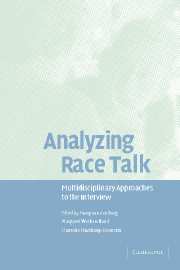Book contents
- Frontmatter
- Contents
- List of contributors
- Preface
- Acknowledgments
- Transcriptions symbols
- Introduction
- 1 Racism and the analysis of cultural resources in interviews
- 2 Analyzing racial discourse: the discursive psychology of mind–world relationships
- 3 Constructivist processes in discourse: a cognitive linguistics perspective
- 4 Institutional, professional, and lifeworld frames in interview talk
- 5 The uses of absurdity
- 6 Multiple voices in talking race: Pakeha reported speech in the discursive construction of the racial other
- 7 Contradictions in interview discourse
- 8 Racism, happiness, and ideology
- 9 The frame analysis of research interviews: social categorization and footing in interview discourse
- 10 Affiliation and detachment in interviewer answer receipts
- 11 Interviewer laughter as an unspecified request for clarification
- 12 Perspectives and frameworks in interviewers' queries
- Appendix: Interview transcripts
- Index
11 - Interviewer laughter as an unspecified request for clarification
Published online by Cambridge University Press: 22 September 2009
- Frontmatter
- Contents
- List of contributors
- Preface
- Acknowledgments
- Transcriptions symbols
- Introduction
- 1 Racism and the analysis of cultural resources in interviews
- 2 Analyzing racial discourse: the discursive psychology of mind–world relationships
- 3 Constructivist processes in discourse: a cognitive linguistics perspective
- 4 Institutional, professional, and lifeworld frames in interview talk
- 5 The uses of absurdity
- 6 Multiple voices in talking race: Pakeha reported speech in the discursive construction of the racial other
- 7 Contradictions in interview discourse
- 8 Racism, happiness, and ideology
- 9 The frame analysis of research interviews: social categorization and footing in interview discourse
- 10 Affiliation and detachment in interviewer answer receipts
- 11 Interviewer laughter as an unspecified request for clarification
- 12 Perspectives and frameworks in interviewers' queries
- Appendix: Interview transcripts
- Index
Summary
Introduction
In interviews, an interviewer and a respondent meet at an arranged time for an encounter with an agreed aim. Both parties must do quite a lot of work to achieve this aim, which is the production of “interview data.” In a technical sense, the aim of the interview has been achieved if the respondent's talk during the interview has been recorded. The recording then can be taken away from the interview setting to the researcher's workplace, where it can be manipulated (transcribed, interpreted, analyzed) by the researcher. From the respondent's perspective, the aim of the interview has been achieved if she has been able to express her ideas about the topics of the interview, and if she is satisfied that the recorded talk represents what she wanted to tell the interviewer and how she wanted to represent herself. From the researcher's perspective, the aim of the interview has been achieved if she has been able to elicit (and record) talk from the respondent that can be transformed (transcribed and reduced) into the data that she wants to get for analysis.
In this volume we deal with data produced in interviews aimed at eliciting talk that would exhibit the ways in which white New Zealanders (Pakehas) make distinctions between their own group and others, and that in the subsequent analysis could be analyzed as instances of “the language of racism” (Wetherell and Potter 1992).
- Type
- Chapter
- Information
- Analyzing Race TalkMultidisciplinary Perspectives on the Research Interview, pp. 200 - 214Publisher: Cambridge University PressPrint publication year: 2004



